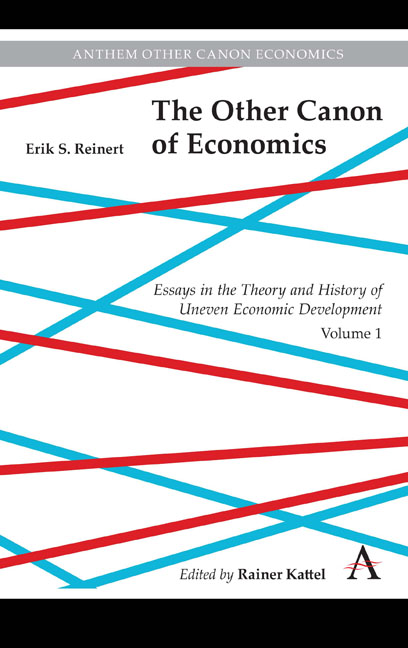Book contents
- Frontmatter
- Dedication
- Contents
- Introduction
- Chapter 1 Catching-up from Way Behind. A Third World Perspective on First World History
- Chapter 2 Recent Trends in Economic Theory — Implications for Development Geography
- Chapter 3 A Schumpeterian Theory of Underdevelopment - A Contradiction in Terms?
- Chapter 4 Competitiveness and Its Predecessors - A 500-Year Cross-national Perspective
- Chapter 5 Diminishing Returns and Economic Sustainability: The Dilemma of Resource-based Economies under a Free Trade Regime
- Chapter 6 Economics: ‘The Dismal Science’ or ‘The Never-ending Frontier of Knowledge’? On Technology, Energy and Economic Welfare
- Chapter 7 Production Capitalism vs. Financial Capitalism – Symbiosis and Parasitism. An Evolutionary Perspective and Bibliography
- Chapter 8 Globalization in the Periphery as a Morgenthau Plan: The Underdevelopment of Mongolia in the 1990s
- Chapter 9 Increasing Poverty in a Globalized World: Marshall Plans and Morgenthau Plans as Mechanisms of Polarization of World Incomes
- Chapter 10 An Early National Innovation System: The Case of Antonio Serra’s 1613 Breve Trattato
- Chapter 11 Innovation Systems of the Past: Modern Nation-States in a Historical Perspective. The Role of Innovations and of Systemic Effects in Economic Thought and Policy
- Chapter 12 The Other Canon: The History of Renaissance Economics
- Chapter 13 Benchmarking Success: The Dutch Republic (1500–1750) as Seen by Contemporary European Economists
- Chapter 14 Mercantilism and Economic Development: Schumpeterian Dynamics, Institution Building and International Benchmarking
- Chapter 15 Development and Social Goals: Balancing Aid and Development to Prevent ‘Welfare Colonialism’
Chapter 9 - Increasing Poverty in a Globalized World: Marshall Plans and Morgenthau Plans as Mechanisms of Polarization of World Incomes
Published online by Cambridge University Press: 13 April 2024
- Frontmatter
- Dedication
- Contents
- Introduction
- Chapter 1 Catching-up from Way Behind. A Third World Perspective on First World History
- Chapter 2 Recent Trends in Economic Theory — Implications for Development Geography
- Chapter 3 A Schumpeterian Theory of Underdevelopment - A Contradiction in Terms?
- Chapter 4 Competitiveness and Its Predecessors - A 500-Year Cross-national Perspective
- Chapter 5 Diminishing Returns and Economic Sustainability: The Dilemma of Resource-based Economies under a Free Trade Regime
- Chapter 6 Economics: ‘The Dismal Science’ or ‘The Never-ending Frontier of Knowledge’? On Technology, Energy and Economic Welfare
- Chapter 7 Production Capitalism vs. Financial Capitalism – Symbiosis and Parasitism. An Evolutionary Perspective and Bibliography
- Chapter 8 Globalization in the Periphery as a Morgenthau Plan: The Underdevelopment of Mongolia in the 1990s
- Chapter 9 Increasing Poverty in a Globalized World: Marshall Plans and Morgenthau Plans as Mechanisms of Polarization of World Incomes
- Chapter 10 An Early National Innovation System: The Case of Antonio Serra’s 1613 Breve Trattato
- Chapter 11 Innovation Systems of the Past: Modern Nation-States in a Historical Perspective. The Role of Innovations and of Systemic Effects in Economic Thought and Policy
- Chapter 12 The Other Canon: The History of Renaissance Economics
- Chapter 13 Benchmarking Success: The Dutch Republic (1500–1750) as Seen by Contemporary European Economists
- Chapter 14 Mercantilism and Economic Development: Schumpeterian Dynamics, Institution Building and International Benchmarking
- Chapter 15 Development and Social Goals: Balancing Aid and Development to Prevent ‘Welfare Colonialism’
Summary
The Problem: Marshall Plans & Morgenthau Plans
During the 1990s, a majority of the world's nations experienced falling real wages. In many cases real wages declined both rapidly and considerably; a human crisis of large proportions is evolving in some former communist countries, while in most Latin American countries, real wages peaked sometime in the late 1970s or early 1980s, and since then have fallen. The term ‘state’ is hardly applicable to several African countries, and this problem of ‘failed states’ is growing. In these nations many institutions, such as educational systems, that used to be handled by the nation state have broken down, and different areas of what used to comprise a nation are ruled over by different warlords. This is a type of political structure that a few years ago was thought of as belonging to a mediaeval past. If there is something called ‘progress’ and ‘modernization’, globalization has – particularly for many small and medium-size nations – brought with it the opposite: many are experiencing ‘retrogression’ and ‘primitivization’. Poverty and disease increase sharply in Sub Saharan Africa, and a creeping ‘Africanization’ in parts of Latin America can be detected.
These events profoundly challenge the present world economic order and the standard textbook economics on which this order rests. This is because the increasingly globalized economy seems to produce opposite effects of what standard economic theory predicts. Instead of a convergence of world income (towards factor-price equalization), we find that a group of rich nations show a tendency to converge, while another convergence group of poor countries gathers at the bottom of the scale. Mainstream logic is that the more backward a nation, the easier it will be to catch up to some imaginary ‘frontier’. In effect, what is actually happening is very different: Nations specialize. Some nations specialize in producing continuous flows of innovations that raise their real wages (‘innovation rents’), whereas other nations specialize either in economic activities where there is very little or no technological change (maquila-type activities), or where technological change takes the form of process innovations (in which technical change is taken out in the form of lower prices to the consumer rather than in higher wages to the workers, who are typically unskilled – particularly in the area of raw material production).
- Type
- Chapter
- Information
- The Other Canon of EconomicsEssays in the Theory and History of Uneven Economic Development, pp. 261 - 282Publisher: Anthem PressPrint publication year: 2024



